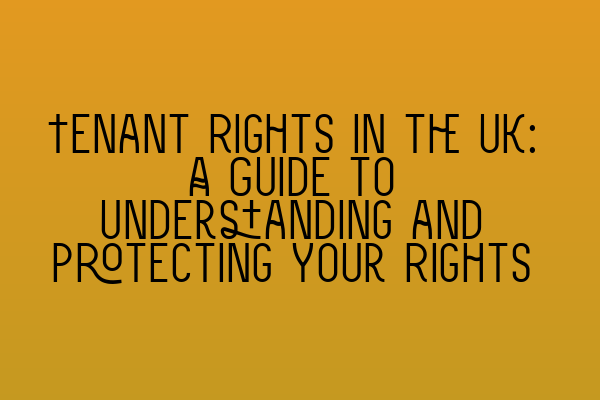Welcome to the blog of SQE Property Law & Land Law! Today, we will explore a topic of utmost importance for tenants in the UK – their rights. Whether you are a new tenant, a long-term renter, or even a landlord seeking to better understand your tenants’ rights, this guide will provide you with valuable insights and information to help you navigate the complex landscape of tenant rights in the UK.
Tenancy Agreements and Assured Shorthold Tenancies
When entering into a tenancy agreement, it is crucial to understand the type of tenancy you have. The most common type of tenancy in the UK is an Assured Shorthold Tenancy (AST), which grants certain rights and protections to both tenants and landlords. An AST typically includes details such as the length of the tenancy, the rental amount, and the responsibilities of both parties.
It is important to read and understand your tenancy agreement thoroughly before signing it. If you have any doubts or concerns, it is advisable to seek legal advice to ensure that your rights are adequately protected. Our team of experienced solicitors at SQE Property Law & Land Law can assist you with any queries you may have regarding your tenancy agreement.
Security of Tenure
One of the key rights for tenants in the UK is the security of tenure. This means that as a tenant, you have the right to remain in the property for the duration of your tenancy, provided you meet your obligations under the tenancy agreement. However, there are certain circumstances where a landlord may be able to evict a tenant, such as for non-payment of rent or breach of other terms of the agreement.
If you believe that your landlord is unlawfully attempting to evict you, it is vital to seek legal advice immediately. Understanding your rights and the appropriate legal recourse is crucial in protecting your tenancy and preventing unlawful evictions.
Repairs and Maintenance
Another important aspect of tenant rights in the UK relates to repairs and maintenance. Landlords are legally obligated to ensure that the property is safe, habitable, and free from hazards. This includes maintaining the structure and exterior of the property, as well as keeping essential utilities in good working order.
If you encounter any issues or need repairs in your rented property, it is essential to notify your landlord in writing as soon as possible. In cases where the landlord fails to address the necessary repairs, you may be able to take legal action or involve the local housing authority. Our team of expert solicitors can guide you through the process of enforcing your rights and obtaining the necessary repairs.
Deposits and Rent Increases
When you rent a property in the UK, it is common for landlords to require a deposit to cover any damages or unpaid rent. However, there are strict regulations governing the handling and protection of tenant deposits. Landlords must protect your deposit in a government-approved tenancy deposit scheme, and they must provide you with the relevant information regarding the scheme within 30 days of receiving your deposit.
In addition, landlords must follow proper procedures when increasing the rent. They must provide notice in writing, usually within a specified period, and adhere to the legal limitations on how much and how often the rent can be increased. If you believe your landlord has unlawfully increased your rent or mishandled your deposit, it is important to seek legal advice to protect your rights.
Discrimination and Harassment
Tenants in the UK are protected against discrimination by the Equality Act 2010. It is illegal for landlords or letting agents to discriminate against tenants based on protected characteristics such as age, disability, race, religion, sex, or sexual orientation. If you believe you have experienced discrimination or harassment in your tenancy, it is crucial to seek legal advice and explore your options for redress.
Understanding and asserting your rights as a tenant can be complex, especially when dealing with difficult landlords or challenging situations. However, with the help of our experienced solicitors at SQE Property Law & Land Law, you can navigate the legal landscape and protect your rights.
We hope that this guide has provided you with a valuable overview of tenant rights in the UK. For more comprehensive guidance on other aspects of contract law, feel free to check out our related articles:
- Interactive SQE Mock Tests for Contract Law: Test Your Knowledge
- Contract Law Reforms: An Analysis of Recent Changes
- Parties in a Contract: Rights and Responsibilities
- The Importance of Ethics in Contract Law: A Comprehensive Guide
- Unveiling Duress and Undue Influence in Contracts
If you require legal assistance or have any questions concerning tenant rights in the UK, please do not hesitate to contact our team at SQE Property Law & Land Law. We are here to provide you with expert guidance and support.
Disclaimer: This blog post is for informational purposes only and should not be considered as legal advice. Seek professional advice before making any legal decisions.
